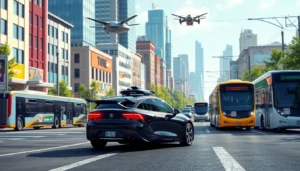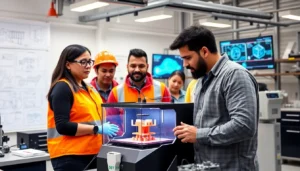Table of Contents
ToggleIn a world where robots might soon take over the coffee-making process, emerging technologies in AI are here to transform everything from how we work to how we play. Imagine a future where your smart fridge not only reminds you to buy milk but also suggests gourmet recipes based on what’s inside. Sounds like sci-fi? Well, it’s happening now!
Overview of Emerging Technologies in AI
Emerging technologies in AI significantly enhance daily living experiences. Intelligent systems aid in managing household tasks and decision-making processes. These advancements include machine learning and natural language processing, enabling devices to understand user commands better. Robotics integration further streamlines chores, allowing tasks like coffee-making to become more efficient and customizable.
Smart appliances play a pivotal role in transforming kitchens into hubs of innovation. Their ability to analyze ingredients and suggest recipes dramatically changes how individuals approach cooking. Devices equipped with AI can adapt to personal preferences, ensuring users receive tailored recommendations. Moreover, these technologies allow for seamless communication between multiple appliances, fostering a collaborative environment that spurs creativity.
Data analytics contributes to refining AI effectiveness. By processing vast amounts of data, systems can identify patterns and trends that improve automation and user interaction. Enhanced predictive algorithms can anticipate user needs, creating a more intuitive experience. This innovation pushes the boundaries of what’s possible, enabling smart fridges to suggest meal plans based on dietary restrictions and remaining ingredients.
Healthcare also benefits greatly from emerging AI technologies. Predictive analytics can lead to earlier diagnosis and personalized treatment plans. Virtual health assistants, powered by AI, facilitate patient interactions and streamline appointment scheduling. Such technologies reduce the burden on healthcare professionals while improving patient care.
Ultimately, these emerging technologies create a future where AI integration in everyday tasks becomes seamless and fluid. Greater efficiency and personalization catapult daily living into a new era. Such advancements demonstrate AI’s potential to reshape human experiences, making life not only easier but also more enriching.
Key Trends Shaping AI
Artificial intelligence undergoes rapid evolution, driven by significant trends that enhance its capabilities. Two primary areas of focus include advancements in machine learning and natural language processing.
Machine Learning Advancements
Machine learning sees innovations that improve efficiency and accuracy. Algorithms evolve to analyze vast amounts of data, leading to better decision-making processes. Enhanced techniques, such as deep learning, enable systems to learn from complex patterns without explicit programming. Companies leverage these improvements to tailor user experiences, adapting systems to individual needs. Deployment of automated machine learning tools simplifies model creation, empowering businesses without extensive data science expertise. Predictive modeling, furthermore, supports proactive actions across various sectors, from finance to healthcare. Improved data handling capabilities help organizations analyze user behavior, streamlining their operations effectively.
Natural Language Processing Developments
Natural language processing experiences breakthroughs that refine human-computer interactions. New models, like transformer architectures, enhance understanding of context, making AI more conversational. These developments lead to improved sentiment analysis, enabling systems to comprehend user emotions better. Voice recognition technology becomes more accurate, allowing seamless communication via smart devices. Multilingual capabilities expand access, fostering global use of AI applications. Integration of context-aware services further personalizes experiences, allowing virtual assistants to respond more appropriately. As these language models evolve, they play crucial roles in applications ranging from customer support to content creation. Enhanced understanding of nuanced language promotes smoother user interaction, making daily tasks more intuitive.
Impact of Emerging Technologies in AI
Emerging AI technologies significantly reshape various sectors and societal norms. Their influence extends from household tasks to large-scale industries.
Industries Transformed by AI Innovations
Healthcare experiences a revolution due to AI innovations, leading to early diagnosis and personalized treatment strategies. Retail adjusts thanks to predictive analytics, optimizing inventory management and enhancing customer experiences. Manufacturing benefits from automation, resulting in increased production efficiency and reduced operational costs. Financial services leverage AI for fraud detection and risk assessment, making processes more reliable and efficient. Transportation adapts with autonomous vehicles, transforming logistics and reducing delivery times.
Societal Implications and Ethical Considerations
Ethical concerns arise as AI technologies infiltrate daily life. Transparency becomes crucial, particularly in algorithms that affect decisions. Privacy issues emerge, prompting discussions on data security and consent. Job displacement also raises concerns, with automation potentially leading to workforce shifts. Developing regulations ensures AI’s ethical application and addresses societal challenges. Balancing technological advancements with ethical considerations remains essential for a harmonious transition into an AI-driven world.
Future Prospects of AI Technologies
Emerging AI technologies promise significant advancements across various sectors. Increasing integration of smart appliances is evident in kitchens, where fridges and ovens not only assist but also suggest recipes based on ingredients at hand. Innovations create an environment where cooking becomes an interactive and enjoyable experience.
Healthcare stands to benefit dramatically from AI advancements. Predictive analytics aids earlier diagnosis and supports personalized treatment plans tailored to individual patient needs. AI-driven virtual health assistants enhance patient interactions, streamlining scheduling and improving overall care quality.
Robotics technology is expected to transform household management. Increased automation of daily tasks creates more efficient processes. As smart appliances learn user preferences, households experience greater convenience.
Retail sectors utilize data analytics for improved inventory management. Predictive algorithms help businesses anticipate demand, thus optimizing the supply chain and minimizing waste. Enhanced personalization drives consumer satisfaction, encouraging loyalty.
Transportation also undergoes a transformation with AI developments. Autonomous vehicles redefine logistics, leading to increased efficiency in shipping and delivery. As algorithms improve, safety features and navigation systems become more reliable.
Ethical considerations remain crucial in the adoption of AI technologies. Transparency in algorithmic decision-making fosters trust among users. Addressing privacy concerns and potential job displacement issues is vital for responsible innovation.
Significant changes in AI integration continue to evolve. The convergence of machine learning and natural language processing creates an environment for seamless interactions. Everyday tasks grow more intuitive, enhancing user experience and overall quality of life.
Challenges in Implementing AI Solutions
Implementing AI solutions presents multiple challenges that organizations face across various sectors. Privacy concerns arise when collecting and analyzing sensitive personal data, making compliance with regulations essential. Ethical considerations regarding algorithmic bias can impact decision-making processes, requiring careful scrutiny to ensure fairness.
Technical integration into existing systems often proves difficult. Traditional infrastructure may lack the capability to support advanced AI technologies, leading to increased costs for upgrades or replacements. Training existing staff on new technologies becomes crucial, as expertise in AI applications is not always readily available.
Change management plays a significant role in successful AI adoption. Employees may resist transitioning to automated processes, fearing job displacement or needing to upskill. Effective communication and support can help alleviate fears and promote a culture embracing innovation.
Data quality remains a critical issue. Incomplete or inaccurate datasets can hinder AI algorithms, resulting in misleading insights or ineffective solutions. Establishing robust data governance practices ensures that organizations maintain high-quality data for training and decision-making.
Sustainability is another challenge associated with AI solutions. The environmental impact of large-scale data centers and high computational demands creates concerns, leading to discussions about greener AI practices. Efforts to decrease energy consumption are essential for aligning AI advancements with environmental goals.
Monitoring and maintaining AI systems also pose ongoing challenges. Continuous evaluation ensures that algorithms function correctly and mitigate potential risks as they evolve. Investing in ongoing support and maintenance becomes necessary to address challenges that arise post-implementation.
Emerging AI technologies are set to redefine everyday life and various industries in profound ways. As smart appliances and intelligent systems become more integrated into daily routines they promise to enhance convenience and personalization. This evolution not only streamlines tasks but also transforms user interactions with technology.
The potential of AI in healthcare retail and transportation highlights its versatility and impact. However the journey toward widespread adoption comes with ethical challenges and societal implications that must be addressed. Balancing innovation with responsibility will be crucial as these technologies continue to evolve.
The future of AI holds exciting possibilities that can enrich human experiences while navigating the complexities of an increasingly automated world. As advancements unfold the importance of transparency and ethical considerations will remain at the forefront of this technological revolution.







